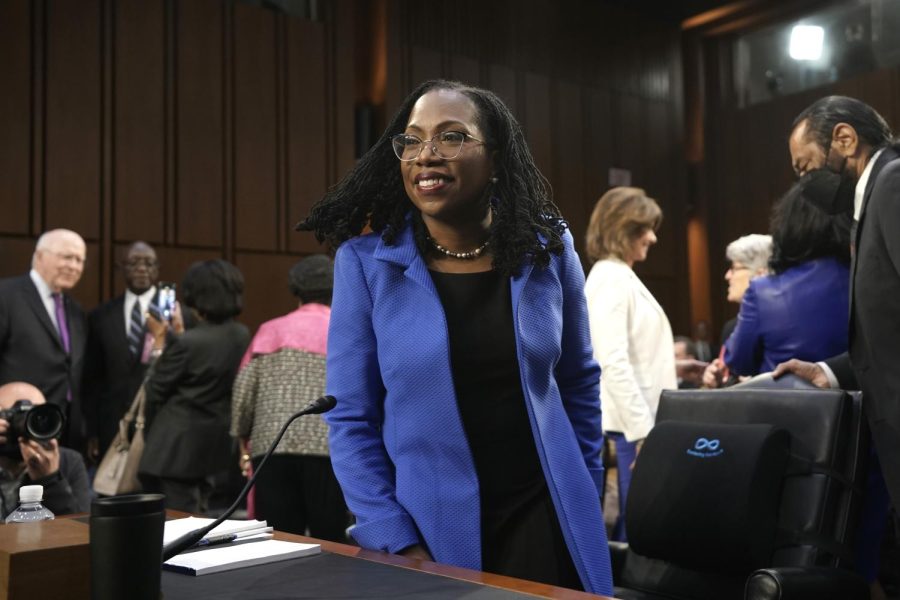Editorial | Judicial confirmation hearings politicize Supreme Court
Photo courtesy of Photo courtesy of Yuri Gripas/Abaca Press/TNS
Judge Ketanji Brown Jackson arrives to testify on the third day of her Senate nomination hearings to be an Associate Justice of the Supreme Court of the United States on Capitol Hill in Washington, D.C. on March 23.
Mar 30, 2022
Supreme Court nominee Ketanji Brown Jackson appeared in front of the Senate Judiciary Committee on March 21 to start her confirmation hearings, which took place over four days. If confirmed, Jackson will be the first Black female Supreme Court Justice in U.S. history.
Jackson boasts a lengthy judicial career. After graduating cum laude from Harvard Law School in 1996, she proceeded to clerk for Supreme Court Justice Stephen Breyer — who she is now nominated to replace — from 1999 to 2000.
Perhaps most notably, Jackson served as a federal public defender from 2005 to 2007, where she represented disadvantaged clients from all walks of the country — if confirmed, Jackson will be the first former public defender to serve on the Supreme Court. Since 2021, Jackson has served as a judge on the U.S. Court of Appeals for the D.C. Circuit.
Like many Supreme Court nominees before her, Jackson has faced her fair share of questioning — however, it is of a different degree than her predecessors.
Tucker Carlson, a host on Fox News, has repeatedly questioned how well Jackson — who, as previously mentioned, graduated from Harvard cum laude — scored on her LSAT. On the other hand, Brett Kavanaugh and Amy Coney Barrett, the last two appointed Supreme Court justices, were not asked to present their LSAT scores in such a public and humiliating manner.
Get The Daily Illini in your inbox!
There seems to be a recurring pattern where people of color in positions of authority are baselessly challenged about their qualifications to hold the position — one can recall former president Donald Trump’s attacks on former president Barack Obama’s birth certificate.
These past confirmation hearings uphold this pattern through a blatant lack of regard for Jackson, who was questioned on issues that were not relevant to the hearings and were pandering to the Republican Party’s far-right base.
On the second day of the hearings, Sen. Marsha Blackburn asked Jackson to define the word “woman,” to which Jackson aptly responded, “I’m not a biologist.” Blackburn later implied that Jackson’s lack of response proved the progressive agenda that she would carry to the Supreme Court.
Along similar lines, Sen. Ted Cruz probed Jackson on her opinions of critical race theory, which Jackson repeatedly stated did not show up in her line of work as a judge.
Gender identity and critical race theory have been prevalent subjects in national headlines recently, yet they have little to do with Jackson’s role as a Supreme Court nominee and have much to do with political agendas.
It is important to conduct discourse on whether an individual is adequately qualified to serve in any position of authority, especially in one as crucial to the American legal foundation as a Supreme Court Justice.
However, Jackson’s judicial confirmation hearings have only served to demonstrate the deep rift between the two parties and have strayed away from the original purpose — determining if Jackson is fit to serve on the Supreme Court.
This political circus can only be fixed if the focus of the hearings shifts from politics to the law once again — only then can we hope to bridge the ever-growing divide that is shaping American politics.






